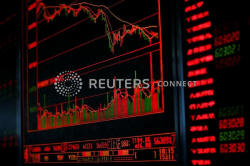Fed rate-cut signal sends stocks up, bond yields and dollar down
 Send a link to a friend
Send a link to a friend
 [June 20, 2019] By
Tom Wilson [June 20, 2019] By
Tom Wilson
LONDON (Reuters) - World stock markets rose
on Thursday after the U.S. Federal Reserve signaled it was likely to cut
interest rates next month. The dollar fell and benchmark bond yields
dropped to multi-year lows.
The Fed on Wednesday suggested rate cuts might start as soon as next
month, saying it was ready to take action in the face of growing
economic risks.
The MSCI world equity index, which tracks shares in 47 countries, gained
0.5% on the prospects of further stimulus, heading for a third day of
gains. The Euro STOXX 600 rose 0.6% to six-week highs.
Wall Street futures indicated U.S. stocks were set to open 0.8% to 1.2%
higher.
In Asia, MSCI's broadest index of Asia-Pacific shares outside Japan rose
1.4%, led by gains in China.

The dollar fell and benchmark U.S. and euro zone government bonds fell
after the Fed's move. The dollar fell 0.4%, on course for its biggest
two-day drop against a basket of other currencies in 14 months, and
dropped to a half-year low against the Japanese yen.
The Fed's rate signal came before meetings at major central banks in
Asia and Europe that were expected to flag similar moves. The European
Central Bank and the Australian central bank had signaled earlier this
week more policy stimulus was needed.
"It becomes a race to the bottom for global rates markets, a race to the
bottom for FX," said Peter Chatwell, head of rates at Mizuho.
The Bank of Japan left rates unchanged on Thursday but stressed that
global risks were rising, suggesting it was leaning toward boosting
monetary support.
Some central banks were prepared to move in the opposite direction,
though. Norway's central bank raised rates, as expected, sending the
Norwegian crown up 1.7% against the dollar and 1% against the euro.
The Bank of England left rates unchanged, as expected, and maintained
its message that rates would need to rise gradually - as long as Britain
can avoid crashing out of the European Union without an agreement.
Still, some investors expressed doubt over how much cutting rates could
do to improve growth.
"The big worry through all this is that central banks have become a
little confident, perhaps overly confident, in their ability to
fine-tune things like inflation and growth," said Kevin Gardiner, global
investment strategist at Rothschild & Co.
[to top of second column] |

A digital board displays stock information at a brokerage office in
Beijing, China, December 7, 2018. REUTERS/Thomas Peter

Elsewhere, oil prices jumped by more than 3% after Iran shot down a U.S. drone
that its Revolutionary Guards said was flying over southern Iran, raising fears
of a military confrontation between Tehran and Washington.
TRADE TALKS
Geopolitical risks elsewhere persisted, although hopes grew for progress in
U.S.-China trade talks. The world's two biggest economies have imposed
increasingly severe tariffs on each other's imports.
Chinese and U.S. officials will hold trade talks following instructions from
their leaders, the Chinese commerce ministry said on Thursday, adding that
Beijing hoped Washington would create the necessary conditions for dialogue.
Christophe Barraud, chief economist at Market Securities in Paris, said stock
markets had so far mostly dodged fallout from the trade war. He warned they
could suffer if economic indicators worsen in the second half of the year.
"Equities are mainly benefiting from the easy money policy, without too much
damage on the economic front," he said. "That may change in H2 ... metrics will
likely weaken through the world because of the impact of ongoing tariffs."
BOND YIELDS DROP
The Fed's dovish tone caused the 10-year U.S. Treasury's yield to fall as low as
1.974%, its lowest since November 2016. It reached 2.8% in January.
Government bonds elsewhere also fell, some to near record lows. Germany's
10-year government bond yield, a benchmark for sovereign debt in the euro zone,
was down 2 basis points at -0.31%, testing this week's record low of -0.329%.
Japanese 10-year bond yields fell to a three-year low of -0.160%, a drop of 2
basis points. The comparable Australian yield fell to a record low below 1.30%.

Brent crude futures were up $1.40 at $63.22 a barrel at 1109 GMT on the tensions
in the Middle East and signs of improving demand in the United States.
(Reporting by Tom Wilson, additional reporting by Abhinav Ramnarayan and Helen
Reid, editing by Larry King)
[© 2019 Thomson Reuters. All rights
reserved.] Copyright 2019 Reuters. All rights reserved. This material may not be published,
broadcast, rewritten or redistributed.
Thompson Reuters is solely responsible for this content. |